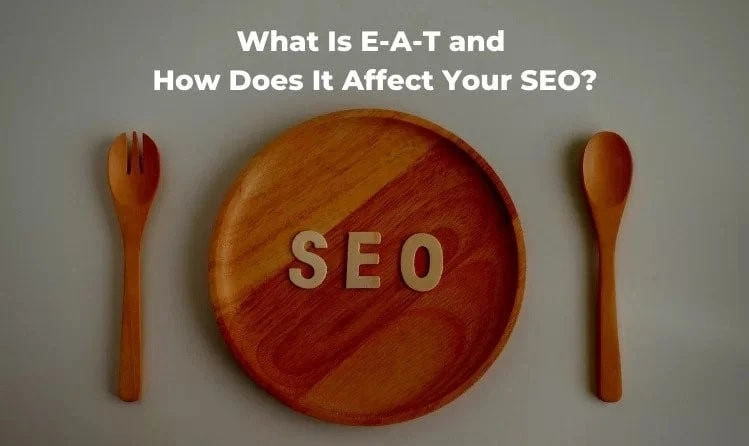E-A-T SEO stands for Expertise, Authoritativeness, and Trustworthiness (E-A-T) Search Engine Optimization (SEO).
E-A-T, a Google search algorithm element, was initially introduced in 2014 and was emphasized again in late 2018 in their "Search Quality Guidelines."
Expertise: A person having in-depth knowledge of a subject is represented by this symbol. Your article should show that you have professional experience and expertise of the subject.
Example: A verified professional writing a blog post.
Authoritativeness: Demonstrate your expertise and the key content\'s authorship by displaying the creator\'s authority (MC).
Example: Displaying the author credentials, job title, bio and relevant experience.
Trustworthiness: Show the user that you trust them. Demonstrate to users that the content producer is trustworthy. Instill trust in the MC with whom people are conversing.
Example: SSL, HTTPS, easily visible contact info, professionalism.
E-A-T-ing SEO
Search performance is naturally bad for websites or webpages that provide no useful function. These pages are frequently made only for the intention of generating money, to hurt or deceive searches, or to give minimal value to users.
Aside from these low-quality pages, useful material is scrutinized, and the amount of E-A-T earned becomes increasingly essential.
"Keep in mind that there are high E-A-T pages and websites of all kinds, including gossip, fashion, humor, forum and Q&A pages, and so on."
Expertise
Demonstrating expertise in your profession.
These are the content authors that are thought to be the most trustworthy in their field.
There are two sorts of experts, according to Google\'s search guidelines:
Formal Expertise
Individuals who are regarded professionals and have competence or accreditation that has been validated.
This is especially crucial for websites in the medical, financial, and legal fields, since erroneous information can cause considerable harm to the user.
Everyday Expertise
Individuals that demonstrate competence based on their life experiences are referred to be experts.
Google\'s search standards describe everyday expertise as follows:
"We will recognize this \'everyday knowledge\' and not punish the person/webpage/website for not having "formal" schooling or training in the industry if the individual providing the material has the type and amount of life experience to make him or her an \'expert\' on the issue."
Establishing Expertise
Your content staff should be the first to establish expertise.
You may either establish a team internally, outsource to freelancers, or hire an experienced content marketing agency as a business owner. The ideal solution for your company is determined by its resources and long-term objectives.
Appropriate resources are employed to ensure factually correct material and professionalism, ensuring that users achieve their goals.
Authoritativeness
It entails showing the content creator\'s credentials as a recognized expert on the subject. The individual who built the MC, the webpage, and the website as a whole is considered authoritative.
Showcase authority by displaying the author’s:
- Professional title
- Certifications
- Short bio
- Photo
- Link to official website
- Link to full bio
The author\'s professional credentials are less essential when it comes to "everyday competence." The search criteria mention a forum person who discusses their story with a loved one who has been diagnosed with liver cancer. "This is an example of sharing personal experiences (in which they are experts), not medical advice," the guidelines add.
Low-quality websites lack the authority required to be regarded a reliable resource. For instance, on a sports news website, you may get medical advice. Despite the fact that the website is a trustworthy source in sports, it lacks the authority to be deemed a trusted source in medical.
Reputation
When it comes to authority, both your website and your firm must have a good reputation.
Your reputation is built on real-world consumer feedback. Google searches for credible portrayals of your company from outside sources. Review-based websites such as Google My Business, the Better Business Bureau, and Yelp are among these sources.
What\'s important to remember here is that the amount of reviews, as well as the context of what\'s stated, are both critical. Customers who have had a single negative experience with a sales professional are more powerful than those who have written credible, thorough evaluations.
Aside from reviews, Google looks for additional references regarding your company, such as expert recommendations, news stories, awards, and any other trustworthy material discovered about your website. User involvement and popularity are considered indicators of reputation in some areas where experts are not clearly defined.
Trust
Trust factors the integrity of your content, website and business.
You can display trust on your website by having:
- A secure website
- Easily accessed
- Contact information
- A thorough about page
- Team photos
- Links from credible websites
- Links pointing to authority sites
- A privacy notice and terms & conditions
Some of these tips may seem self-evident, but at the end of the day, building trust is about making your people feel secure.
Users develop trust by knowing they can chat with a real person if they need to. Contact information is prominently presented.
The information on your about page tells visitors who you are and what you\'re all about.
Including photographs of your employees gives users a sense of security by giving a face to your business.
These small details add together to make your website a reliable resource.
Wrapping up
It\'s not something you can instantly repair, produce, or establish; it\'s a long-term process that takes time to develop.
The first step is straightforward.
Prioritize your customers.
You promise to producing authentic, accurate, and trustworthy information that is shown in a secure environment by putting your users first.
Keep that commitment, and your content marketing and SEO efforts will provide more desirable outcomes.



